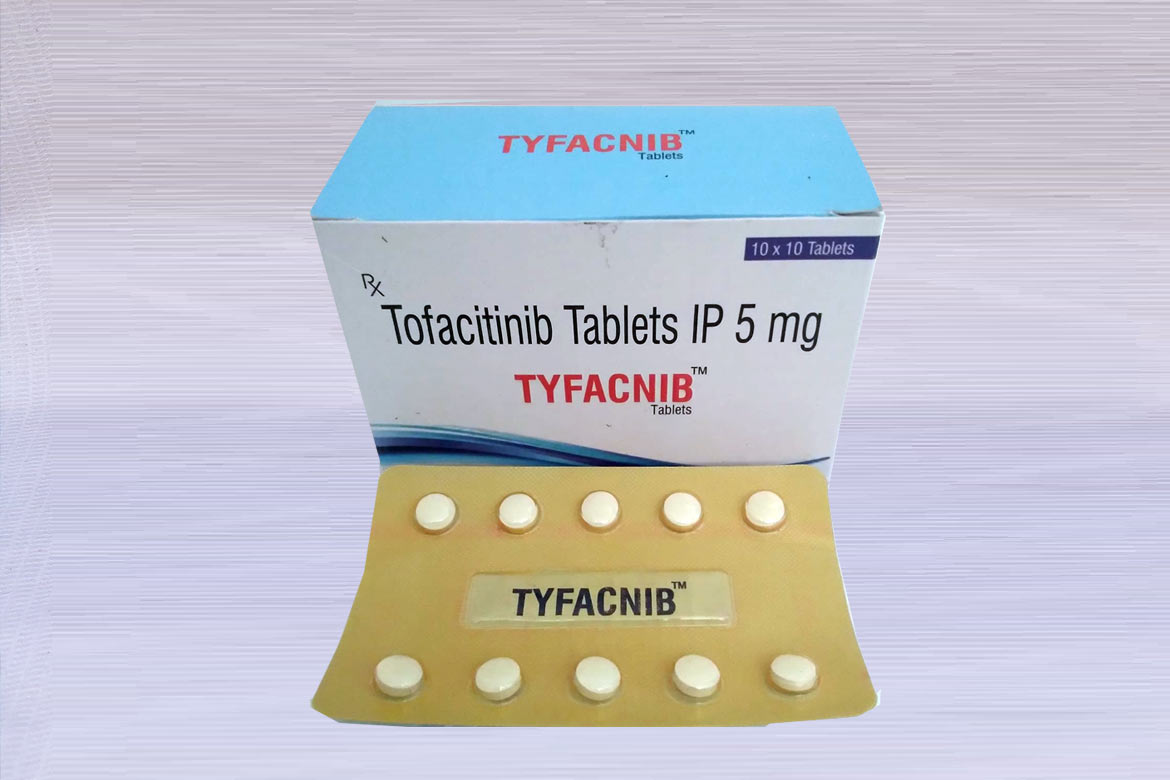About TY FACNIB
Tofacitinib Citrate is an oral, small molecule drug used to treat adults with moderate to severe active rheumatoid arthritis (RA), active psoriatic arthritis, moderate to severe ulcerative colitis, ankylosing spondylitis, and children ages 2 Years an older with active polyarticular juvenile idiopathic arthritis. Tofacitinib works by blocking the body’s production of enzymes called Janus kinases (JAKs). JAKs play a role in joint inflammation in RA, which can cause pain, swelling, and stiffness. This medication is most commonly used after methotrexate and tumor necrosis factor inhibitors.
Indication
Tofacitinib is indicated for the treatment of adult patients with moderately-to-severely active rheumatoid arthritis (RA), active psoriatic arthritis, active ankylosing spondylitis, or moderately-to-severely active ulcerative colitis who have had an inadequate response or intolerance to one or more TNF blockers.5 It is also indicated as an oral solution in patients ≥2 years of age for the treatment of polyarticular course juvenile idiopathic arthritis who have had an inadequate response or intolerance to one or more TNF blockers.
Tofacitinib is not recommended to be used in combination with other biologic disease-modifying anti-rheumatic drugs (DMARDs) or potent immunosuppressive agents such as azathioprine or cyclosporine.
Uses of TY FACNIB
- Moderate to Severe Ulcerative Colitis
- Polyarticular Juvenile Idiopathic Arthritis
- Psoriatic Arthritis
- Active Ankylosing spondylitis
- Moderate Rheumatoid arthritis
- Severe Rheumatoid arthritis
Pharmacodynamics
Tofacitinib targets inflammation present in rheumatoid arthritis by inhibiting the janus kinases involved in the inflammatory response pathway.
In placebo controlled trials of rheumatoid arthritis patients receiving 5mg or 10mg of tofacitinib twice daily, higher ACR20 responses were observed within 2 weeks in some patients (with ACR20 being defined as a minimum 20% reduction in joint pain or tenderness and 20% reduction in arthritis pain, patient disability, inflammatory markers, or global assessments of arthritis by patients or by doctors, according to the American College of Rheumatology (ACR) response criteria list), and improvements in physical functioning greater than placebo were also noted.
Common known adverse effects of tofacitinib include headaches, diarrhea, nausea, nasopharyngitis and upper respiratory tract infection. More serious immunologic and hematological adverse effects have also been noted resulting in lymphopenia, neutropenia, anemia, and increased risk of cancer and infection.
Before initiations of tofacitinib patients should be tested for latent infections of tuberculosis, and should be closely monitored for signs and symptoms of infection (fungal, viral, bacterial, or mycobacterial) during therapy. Therapy is not to be started in the presence of active infection, systemic or localized, and is to be interrupted if a serious infection occurs.
Tofacitinib has been associated with an increased risk of lymphomas, such as Epstein-Barr virus associated lymphomas, and other malignancies (including lung, breast, gastric, and colorectal cancers). It is recommended to monitor lymphocytes, neutrophils, hemoglobin, liver enzymes, and lipids.
Tofacitinib use is associated with a rapid decrease in C-reactive protein (CRP), dose dependent decreases in natural killer cells, and dose dependent increases in B cells. Depression in C-reactive protein levels continue after 2 weeks of tofacitinib discontinuation and suggest that pharmacodynamic activity last longer than pharmacokinetic half life.
Mechanism of Action
Rheumatoid arthritis is an autoimmune disease characterized by a dysregulation of pro-inflammatory cytokines including IL7, IL15, IL21, IL6, IFN-alpha, and IFN-beta. (3) Cytokines signalling results in tissue inflammation and joint damage by stimulating the recruitment and activation of immune cells via the janus kinase signalling pathway.
Tofacitinib is a partial and reversible janus kinase (JAK) inihibitor that will prevent the body from responding to cytokine signals. By inhibiting JAKs, tofacitinib prevents the phosphorylation and activation of STATs. The JAK-STAT signalling pathway is involved in the transcription of cells involved in hematopoiesis, and immune cell function. Tofacitinib works therapeutically by inhibiting the JAK-STAT pathway to decrease the inflammatory response. However, there is evidence to suggest that it may also achieve efficacy via other pathways as well.

